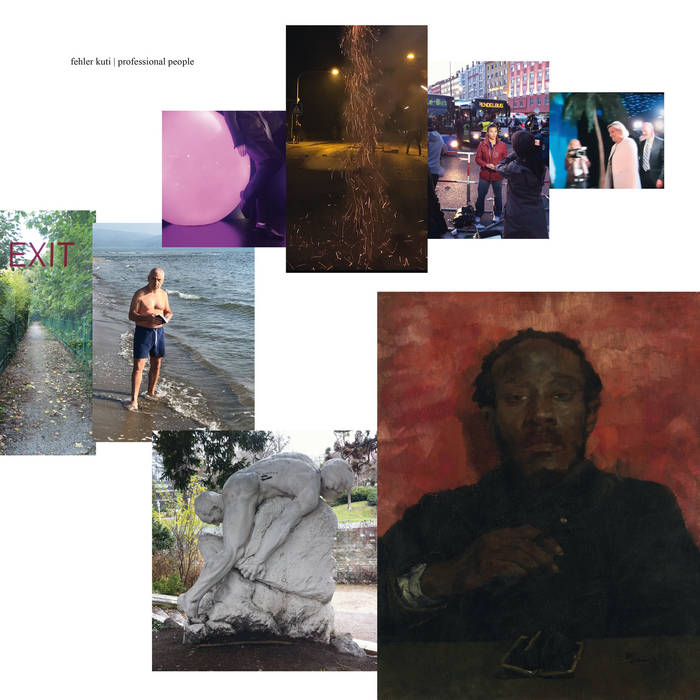 Seeing this release announced as music for "squares" or gated communities, unlikely to appeal to your "woke friends" made me approach it as one might any potential minefield. Learning that Julian Warner, aka Fehler Kuti, is a cultural anthropologist, actor, writer, editor, speaker, art festival curator and producer didn’t lighten the mood much as I feared an onslaught of dry polemic. What a relief then to simply get hooked by these hypnotic tunes - several of which were lullabies for Warner’s newborn child. Professional People reveals as a transcultural concept album, lightly touched with softly spoken wit, 8-bit space jazz, cosmic Euro-pulse, pan, chant, Afro-neon groove, wordless harmony, and melancholic synth. Some of the song titles can act as political signposts, but lyrics are few, mostly oblique, and any message subliminal: hidden in plain sight amid references to bureaucracy, cars, office buildings, home, leisure, gardens, and security. There is no holy indigestible agitprop, no denial of anyone else’s struggle, and Warner leaves academic language and analyses of class, race, and history for the books. He’s razor sharp, but kind, and rather than cutting with words he sprinkles sardonic humor and personal history in with broader observations. The whole record invites everyone to swing along together in our various states of alienated inclusion. Phew. I won’t hear many more enjoyable albums this year.
Seeing this release announced as music for "squares" or gated communities, unlikely to appeal to your "woke friends" made me approach it as one might any potential minefield. Learning that Julian Warner, aka Fehler Kuti, is a cultural anthropologist, actor, writer, editor, speaker, art festival curator and producer didn’t lighten the mood much as I feared an onslaught of dry polemic. What a relief then to simply get hooked by these hypnotic tunes - several of which were lullabies for Warner’s newborn child. Professional People reveals as a transcultural concept album, lightly touched with softly spoken wit, 8-bit space jazz, cosmic Euro-pulse, pan, chant, Afro-neon groove, wordless harmony, and melancholic synth. Some of the song titles can act as political signposts, but lyrics are few, mostly oblique, and any message subliminal: hidden in plain sight amid references to bureaucracy, cars, office buildings, home, leisure, gardens, and security. There is no holy indigestible agitprop, no denial of anyone else’s struggle, and Warner leaves academic language and analyses of class, race, and history for the books. He’s razor sharp, but kind, and rather than cutting with words he sprinkles sardonic humor and personal history in with broader observations. The whole record invites everyone to swing along together in our various states of alienated inclusion. Phew. I won’t hear many more enjoyable albums this year.
Alien Transistor
With the aid of stalwarts from The Notwist, Fehler Kuti builds a laid back sound with drive but also plenty of breathing space. Markus Acher's brilliant drumming is key, and Micha Acher adds sousaphone and trumpet flourishes. Equally, Sascha Schwegeler's steel drum helps make "Transatlantic Ideology" a standout track. Here Kuti gently references a popcultural and socio-theoretical Afro-Americanophilia in Germany that must be addressed as it deflects from anti-racist movements and away from other racist exploitations (systematic exclusion of Romani people, capitalist exploitation of eastern European migrant laborers). Off record he points out that Black Germans do not make up a racialized labor underclass, so in this sense the leftist fetish of the African American plight is devoid of its revolutionary potential when directed at the Black German. I say "gently" but, as with several stunning lines laid into the fabric of this album "Is a black man humanoid?" made me jump. I uncomfortably recalled the satirical essay "Are The Jews Human?" which got that awkward old stick Wyndham Lewis into a spot of critical bother. Whereas Lewis was brilliant but easily depicted as a brute, Warner’s unflinching honesty about his own status as a professional "manager of color" is his calling card. He insists his class are using the paradigm of diversity as a tool to escape their fate, without changing the class relations as a whole. Who better, then, to warn us: "This song is a song to end all ties, to say goodbye to old, and say hello to new, lies." If that sounds heavy, it’s actually as catchy as The Bonzo Dog Band doing "Terry Keeps His Clips On."



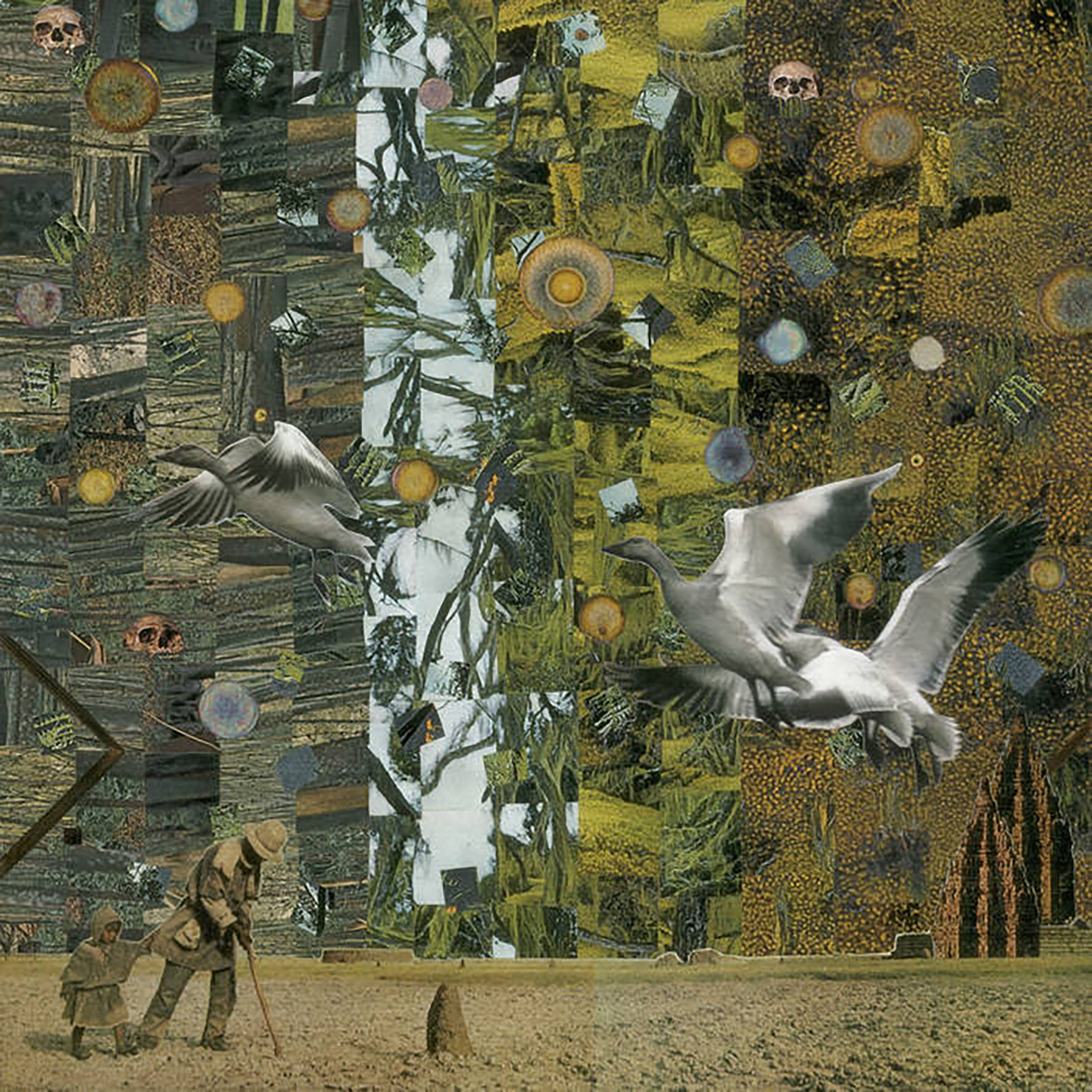 This latest double album from the California-based Fritch is something of a culmination of two separate long journeys, as it took eight misfortune-filled years to complete and it also concludes Lost Tribe's "Built Upon a Fearful Void" series. While I am not necessarily sure that Fritch himself would agree that the end result was worth suffering through the gauntlet of lost hard drives and water-damaged tape reels that he had to navigate to get to this point, Built Upon a Fearful Void nevertheless meets my dauntingly high expectations for any major new statement from the composer. That said, I am certainly curious about how much the album changed between the ruined tape reels and Fritch's decision to abandon "what remained of the salvaged material" and "rerecord the album entirely using only faint flickers of the old tapes and cassettes." On one hand, some magic simply cannot be recaptured, yet that loss is balanced by the fact that Fritch's work seems to only get better and better with each passing year. In any case, anyone who fell in love with Fritch's work from 2019's Deceptive Cadence will likely love this album too (particularly its first half), as Built Upon a Fearful Void is another impossibly rich and vivid plunge into a dreamlike and cinematic vision of bittersweet Americana (and some other very likable other things as well).
This latest double album from the California-based Fritch is something of a culmination of two separate long journeys, as it took eight misfortune-filled years to complete and it also concludes Lost Tribe's "Built Upon a Fearful Void" series. While I am not necessarily sure that Fritch himself would agree that the end result was worth suffering through the gauntlet of lost hard drives and water-damaged tape reels that he had to navigate to get to this point, Built Upon a Fearful Void nevertheless meets my dauntingly high expectations for any major new statement from the composer. That said, I am certainly curious about how much the album changed between the ruined tape reels and Fritch's decision to abandon "what remained of the salvaged material" and "rerecord the album entirely using only faint flickers of the old tapes and cassettes." On one hand, some magic simply cannot be recaptured, yet that loss is balanced by the fact that Fritch's work seems to only get better and better with each passing year. In any case, anyone who fell in love with Fritch's work from 2019's Deceptive Cadence will likely love this album too (particularly its first half), as Built Upon a Fearful Void is another impossibly rich and vivid plunge into a dreamlike and cinematic vision of bittersweet Americana (and some other very likable other things as well). With two different releases in 2021, Jim Campbell (as Rrill Bell) follows up 2020's Ballad of the External Life going in two very different thematic directions. A cassette, False Flag Rapture, is a personal, intimate work based around a recording of his grandmother, while the digital (available with printed material as well) Blade’s Return is a narrative tale about a saw (I am not sure if it is truly meant to be anthropomorphic or not). Both feel rather different from each other, but both also feature the heavy tape manipulations of Campbell, reducing instrument recordings to raw material that he shapes into entirely different and unique forms.
With two different releases in 2021, Jim Campbell (as Rrill Bell) follows up 2020's Ballad of the External Life going in two very different thematic directions. A cassette, False Flag Rapture, is a personal, intimate work based around a recording of his grandmother, while the digital (available with printed material as well) Blade’s Return is a narrative tale about a saw (I am not sure if it is truly meant to be anthropomorphic or not). Both feel rather different from each other, but both also feature the heavy tape manipulations of Campbell, reducing instrument recordings to raw material that he shapes into entirely different and unique forms. Given that Anderson and Tyler began working together a few days after participating in an event commemorating David Berman, it is not a huge surprise that their guitar instrumentals have a Bermaneque feeling; making myth of the American landscape with moments, as the late poet sang, "when the here and the hereafter momentarily align."
Given that Anderson and Tyler began working together a few days after participating in an event commemorating David Berman, it is not a huge surprise that their guitar instrumentals have a Bermaneque feeling; making myth of the American landscape with moments, as the late poet sang, "when the here and the hereafter momentarily align." Under a name (Trip Shrubb) taken from a gravestone in Northamptonshire, Michael Beckett presents a cool subterranean selection from his own 84-track transformation of one of the best records ever released: the
Under a name (Trip Shrubb) taken from a gravestone in Northamptonshire, Michael Beckett presents a cool subterranean selection from his own 84-track transformation of one of the best records ever released: the 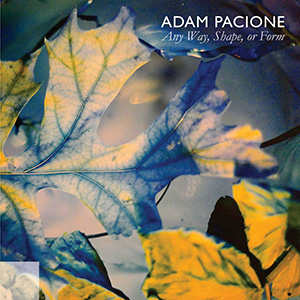 Austin based composer and photographer Adam Pacione's recorded work has been largely digital over the past 10 years or so, which makes this lavish four disc collection all the more significant. Any Way, Shape, or Form complies 2009's Still Life series of subscription only 3" CDRs alongside some other unreleased and rare material from the same era, based around material recorded between 1999 and 2009. In some ways the box is a massive undertaking, though split into comfortably bite sized pieces that perfectly capture Pacione's brand of unique ambient work, it is enjoyable in any listening arrangement.
Austin based composer and photographer Adam Pacione's recorded work has been largely digital over the past 10 years or so, which makes this lavish four disc collection all the more significant. Any Way, Shape, or Form complies 2009's Still Life series of subscription only 3" CDRs alongside some other unreleased and rare material from the same era, based around material recorded between 1999 and 2009. In some ways the box is a massive undertaking, though split into comfortably bite sized pieces that perfectly capture Pacione's brand of unique ambient work, it is enjoyable in any listening arrangement.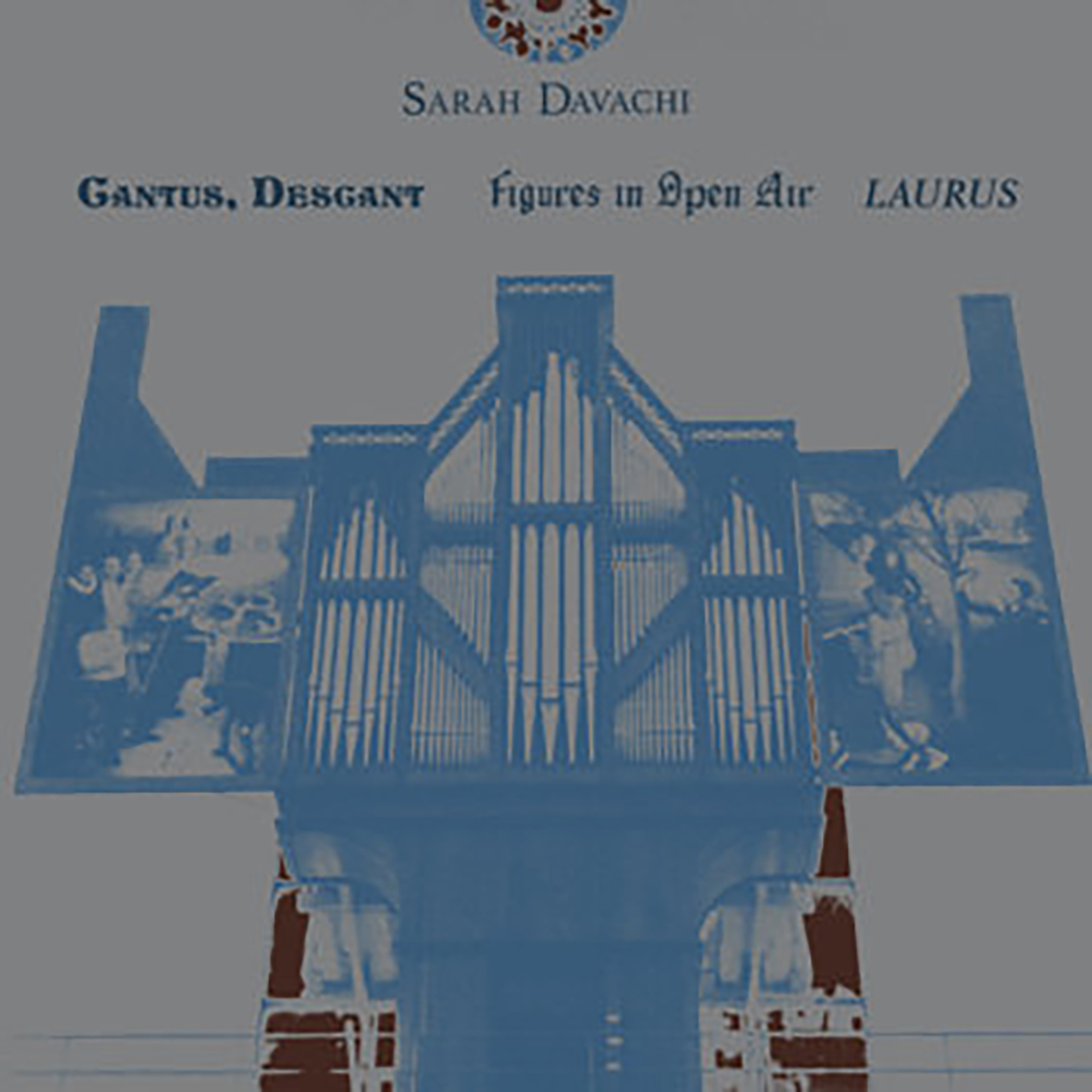 This five-CD boxed set ambitiously compiles all three of Davachi's interrelated 2020 albums released on her own Late Music imprint. Given that Figures in Open Air alone features two pieces that clock in around an hour each, this collection presents an absolutely overwhelming amount of similar-sounding material. That said, Cantus, Descant seems to be one of Davachi's more beloved releases among fans despite its unswerving devotion to pipe organ-centered minimalism. That makes this collection an inspired idea, as it presents that constrained vision in three differing stages: its "more raw and improvisational" beginnings (Laurus), the polished and meticulously crafted studio album, and some great live performances from the period when this era was taking shape. Each of the three albums features some sublime highlights, which will likely inspire me to curate my own condensed version. That distillation will give me the sustained and focused beauty that I want from a Sarah Davachi album, but Cantus Figures Laurus can also provide a calming five-hour respite in a cathedral of drones. It is not unlike a portable version of La Monte Young's Dream House, if he were into church music instead of psychotropic Just Intonation harmonies. Hell, it can even be an interactive one, as listeners can enhance their experience with their own Marian Zazeela-inspired light shows.
This five-CD boxed set ambitiously compiles all three of Davachi's interrelated 2020 albums released on her own Late Music imprint. Given that Figures in Open Air alone features two pieces that clock in around an hour each, this collection presents an absolutely overwhelming amount of similar-sounding material. That said, Cantus, Descant seems to be one of Davachi's more beloved releases among fans despite its unswerving devotion to pipe organ-centered minimalism. That makes this collection an inspired idea, as it presents that constrained vision in three differing stages: its "more raw and improvisational" beginnings (Laurus), the polished and meticulously crafted studio album, and some great live performances from the period when this era was taking shape. Each of the three albums features some sublime highlights, which will likely inspire me to curate my own condensed version. That distillation will give me the sustained and focused beauty that I want from a Sarah Davachi album, but Cantus Figures Laurus can also provide a calming five-hour respite in a cathedral of drones. It is not unlike a portable version of La Monte Young's Dream House, if he were into church music instead of psychotropic Just Intonation harmonies. Hell, it can even be an interactive one, as listeners can enhance their experience with their own Marian Zazeela-inspired light shows. In Peru, Gonzalo Benavente Secco’s controversial documentary La revolución y la tierra, has drawn huge cinema audiences, perhaps because its subject, the 1969 Land Reform Act, still bitterly divides opinion more than fifty years later. So much so that TV Peru bowed to pressure and refused to broadcast the film, which skillfully folds scenes from old Pervuian films into the mix, in the run up to the elections of 2021. Santiago Pilado-Matheu’s deceptively simple soundtrack uses ambient electronics, loops, dubby Afro-Latin rhythms, Andean drone and melody, film dialogue, and speech excerpts by peasant leaders, to create a comforting yet sinister landscape of memory.
In Peru, Gonzalo Benavente Secco’s controversial documentary La revolución y la tierra, has drawn huge cinema audiences, perhaps because its subject, the 1969 Land Reform Act, still bitterly divides opinion more than fifty years later. So much so that TV Peru bowed to pressure and refused to broadcast the film, which skillfully folds scenes from old Pervuian films into the mix, in the run up to the elections of 2021. Santiago Pilado-Matheu’s deceptively simple soundtrack uses ambient electronics, loops, dubby Afro-Latin rhythms, Andean drone and melody, film dialogue, and speech excerpts by peasant leaders, to create a comforting yet sinister landscape of memory. Since the invention of cassette tapes, every country has had its own independent tape scene—whether independent musicians with limited release output via the medium or distributors sharing music under harsh conditions. Spain is particularly distinct in this time since, following the death of dictator Francisco Franco the prior decade, the country's creative class was reawakened and allowed to flourish. This tasty compilation from Swiss label Bongo Joe harnesses this movement, focusing on an array of Spanish and Spanish-related electronic music released between 1983 and 1990 that bleeds exoticism rooted in ambient investigations. The compilation succeeds at painting a picture of a lesser-known world of Balearic mysticism with Ibiza-influenced beats and treatments.
Since the invention of cassette tapes, every country has had its own independent tape scene—whether independent musicians with limited release output via the medium or distributors sharing music under harsh conditions. Spain is particularly distinct in this time since, following the death of dictator Francisco Franco the prior decade, the country's creative class was reawakened and allowed to flourish. This tasty compilation from Swiss label Bongo Joe harnesses this movement, focusing on an array of Spanish and Spanish-related electronic music released between 1983 and 1990 that bleeds exoticism rooted in ambient investigations. The compilation succeeds at painting a picture of a lesser-known world of Balearic mysticism with Ibiza-influenced beats and treatments.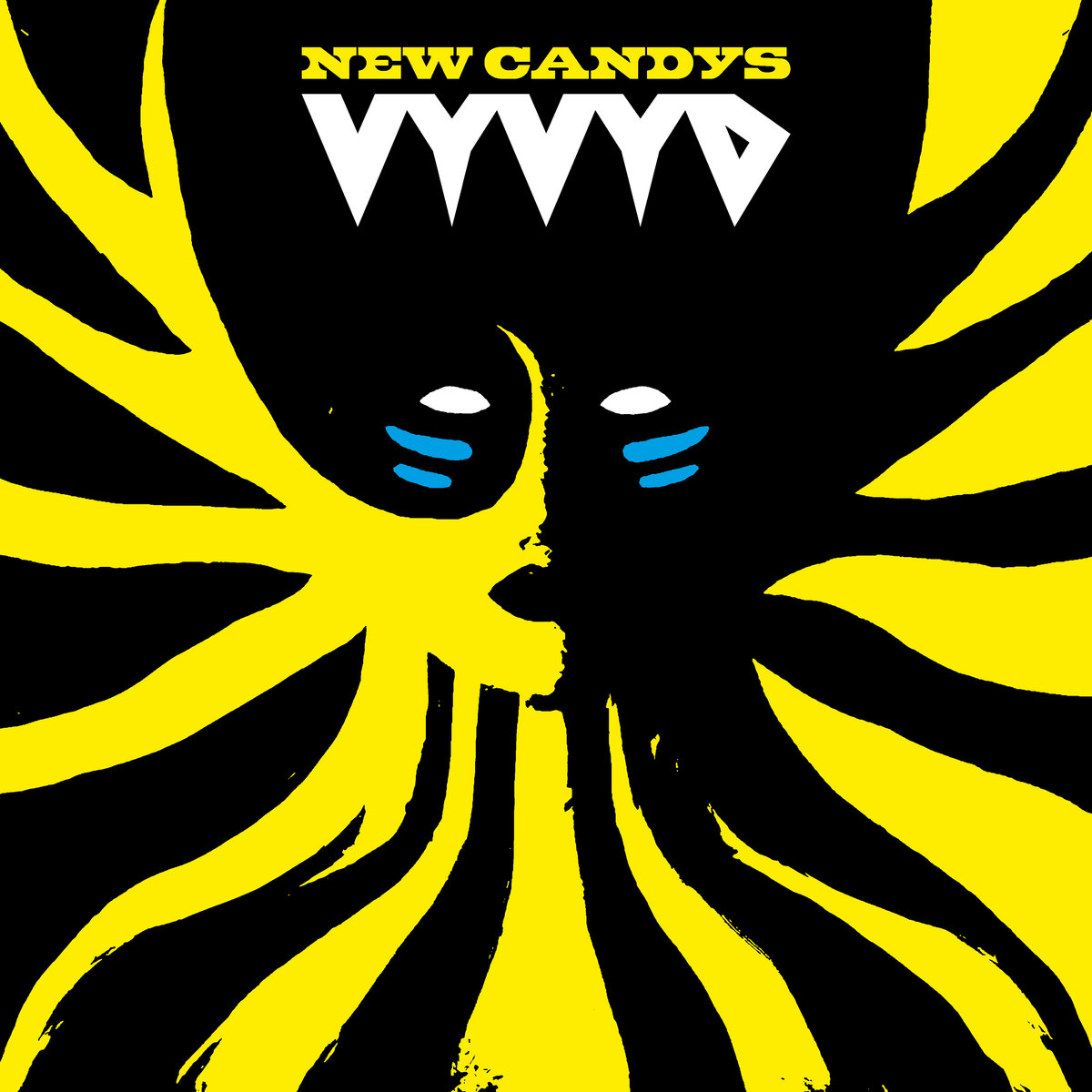 The latest from Italy's New Candys blasts immediately from the gate with an ear-candy combination of pulsating synth and massive drums, bass to match, and world-weary vocals before exploding into millions of crystalline guitar chords coated in fuzz-drenched reverb, resulting in what is quite possibly the most danceable tune the group has ever crafted. All the psyched-out power of prior releases exists, but their fourth full-length comes with the added bonus of cleaner production, allowing the powerhouse rhythm section to step forward amidst what feels to be a recharged songwriting team. Vyvyd becomes less a title and more an experience.
The latest from Italy's New Candys blasts immediately from the gate with an ear-candy combination of pulsating synth and massive drums, bass to match, and world-weary vocals before exploding into millions of crystalline guitar chords coated in fuzz-drenched reverb, resulting in what is quite possibly the most danceable tune the group has ever crafted. All the psyched-out power of prior releases exists, but their fourth full-length comes with the added bonus of cleaner production, allowing the powerhouse rhythm section to step forward amidst what feels to be a recharged songwriting team. Vyvyd becomes less a title and more an experience.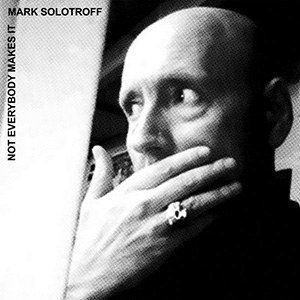 Mark Solotroff could never be accused of taking it easy when it comes to music, both in terms of style and productivity. Since the beginning of 2020 he has been responsible for three side project releases (Nightmares, The Fortieth Day, and Ensemble Sacrés Garçons), two archival releases from his early Intrinsic Action band, and just a matter of weeks ago a BLOODYMINDED! live compilation. Add that to three volumes of compiled solo material and an album last year, and there’s a massive stack of material that Not Everybody Makes It now sits atop. Even with all of that material, this new album stands out as distinct, and somewhat of an unexpected turn for Solotroff's work, but is still clearly his.
Mark Solotroff could never be accused of taking it easy when it comes to music, both in terms of style and productivity. Since the beginning of 2020 he has been responsible for three side project releases (Nightmares, The Fortieth Day, and Ensemble Sacrés Garçons), two archival releases from his early Intrinsic Action band, and just a matter of weeks ago a BLOODYMINDED! live compilation. Add that to three volumes of compiled solo material and an album last year, and there’s a massive stack of material that Not Everybody Makes It now sits atop. Even with all of that material, this new album stands out as distinct, and somewhat of an unexpected turn for Solotroff's work, but is still clearly his.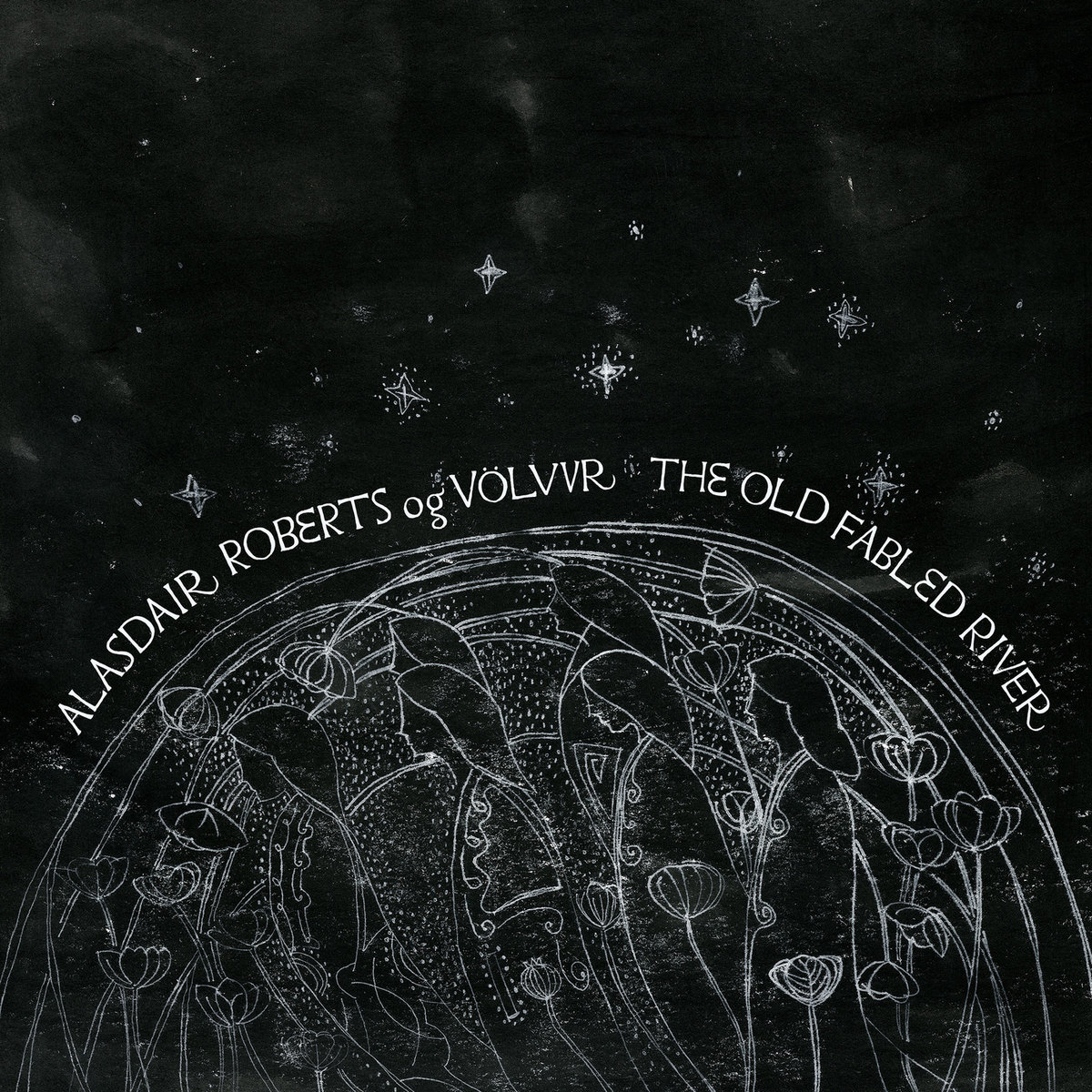 Alasdair Roberts’ creative spirit and respect for tradition dovetail perfectly on this collaboration with Norwegian collective, Völvur. With traditional songs (in both artists’ languages) balanced by four new Roberts compositions, and the latter’s plaintive voice complemented by both Marthe Lea’s beautiful singing and the collective’s edgy, swinging and restrained playing, The Old Fabled River is joyous and mournful in equal measure.
Alasdair Roberts’ creative spirit and respect for tradition dovetail perfectly on this collaboration with Norwegian collective, Völvur. With traditional songs (in both artists’ languages) balanced by four new Roberts compositions, and the latter’s plaintive voice complemented by both Marthe Lea’s beautiful singing and the collective’s edgy, swinging and restrained playing, The Old Fabled River is joyous and mournful in equal measure. Legendary German kosmiche band Can is not a "hits" band. Despite being known for classic studio work with individual tracks such as "Vitamin C," "Halleluwah," "Mother Sky," and "Future Days," Can, first and foremost, are an improvisational band. While this was a core driver of their studio output, it is particularly evident in their live performances, of which bootlegs of assorted quality exist, noted for never playing a song the same way twice. Singer Damo Suzuki had left the group by this time and Can had released their sixth official studio recording, Landed, an album some fans identify as the marker of Can's slide from greatness. A meticulously produced album, the rock sheen of that studio album could not tell the story of Can's true nature. This polished bootleg — for which we have a devoted fan with large pants to thank — separates the studio mystique from the musicians, showcasing their enduring and practiced talent, revealing the genius of the band's four original members that forever make Can an icon of music history.
Legendary German kosmiche band Can is not a "hits" band. Despite being known for classic studio work with individual tracks such as "Vitamin C," "Halleluwah," "Mother Sky," and "Future Days," Can, first and foremost, are an improvisational band. While this was a core driver of their studio output, it is particularly evident in their live performances, of which bootlegs of assorted quality exist, noted for never playing a song the same way twice. Singer Damo Suzuki had left the group by this time and Can had released their sixth official studio recording, Landed, an album some fans identify as the marker of Can's slide from greatness. A meticulously produced album, the rock sheen of that studio album could not tell the story of Can's true nature. This polished bootleg — for which we have a devoted fan with large pants to thank — separates the studio mystique from the musicians, showcasing their enduring and practiced talent, revealing the genius of the band's four original members that forever make Can an icon of music history. Seeing this release announced as music for "squares" or gated communities, unlikely to appeal to your "woke friends" made me approach it as one might any potential minefield. Learning that Julian Warner, aka Fehler Kuti, is a cultural anthropologist, actor, writer, editor, speaker, art festival curator and producer didn’t lighten the mood much as I feared an onslaught of dry polemic. What a relief then to simply get hooked by these hypnotic tunes - several of which were lullabies for Warner’s newborn child. Professional People reveals as a transcultural concept album, lightly touched with softly spoken wit, 8-bit space jazz, cosmic Euro-pulse, pan, chant, Afro-neon groove, wordless harmony, and melancholic synth. Some of the song titles can act as political signposts, but lyrics are few, mostly oblique, and any message subliminal: hidden in plain sight amid references to bureaucracy, cars, office buildings, home, leisure, gardens, and security. There is no holy indigestible agitprop, no denial of anyone else’s struggle, and Warner leaves academic language and analyses of class, race, and history for the books. He’s razor sharp, but kind, and rather than cutting with words he sprinkles sardonic humor and personal history in with broader observations. The whole record invites everyone to swing along together in our various states of alienated inclusion. Phew. I won’t hear many more enjoyable albums this year.
Seeing this release announced as music for "squares" or gated communities, unlikely to appeal to your "woke friends" made me approach it as one might any potential minefield. Learning that Julian Warner, aka Fehler Kuti, is a cultural anthropologist, actor, writer, editor, speaker, art festival curator and producer didn’t lighten the mood much as I feared an onslaught of dry polemic. What a relief then to simply get hooked by these hypnotic tunes - several of which were lullabies for Warner’s newborn child. Professional People reveals as a transcultural concept album, lightly touched with softly spoken wit, 8-bit space jazz, cosmic Euro-pulse, pan, chant, Afro-neon groove, wordless harmony, and melancholic synth. Some of the song titles can act as political signposts, but lyrics are few, mostly oblique, and any message subliminal: hidden in plain sight amid references to bureaucracy, cars, office buildings, home, leisure, gardens, and security. There is no holy indigestible agitprop, no denial of anyone else’s struggle, and Warner leaves academic language and analyses of class, race, and history for the books. He’s razor sharp, but kind, and rather than cutting with words he sprinkles sardonic humor and personal history in with broader observations. The whole record invites everyone to swing along together in our various states of alienated inclusion. Phew. I won’t hear many more enjoyable albums this year. 1988's Love Hysteria was my introduction to Peter Murphy as a solo artist, likely initiated by MTV's 120 Minutes airplay of "All Night Long." A minor hit in the United States, this and a host of other strong tracks from Murphy's second solo release would see Murphy exposed to a renewed audience as a solo performer, those both unfamiliar and familiar with his back catalog. Some of this may be attributable to the start of Murphy's songwriting collaboration with Paul Statham (ex B-Movie). This fruitful union would see the two working together for another six albums, producing some of his best-loved works over the next few years. This work alone spawned the aforementioned "All Night Long" as well as masterworks "Indigo Eyes," "Dragnet Drag," and "Blind Sublime."
1988's Love Hysteria was my introduction to Peter Murphy as a solo artist, likely initiated by MTV's 120 Minutes airplay of "All Night Long." A minor hit in the United States, this and a host of other strong tracks from Murphy's second solo release would see Murphy exposed to a renewed audience as a solo performer, those both unfamiliar and familiar with his back catalog. Some of this may be attributable to the start of Murphy's songwriting collaboration with Paul Statham (ex B-Movie). This fruitful union would see the two working together for another six albums, producing some of his best-loved works over the next few years. This work alone spawned the aforementioned "All Night Long" as well as masterworks "Indigo Eyes," "Dragnet Drag," and "Blind Sublime."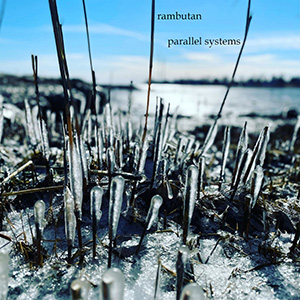 As his primary (and solo) project, Albany’s Eric Hardiman's Rambutan is always in flux. Some of his many other projects are a bit more predictable: Sky Furrows is 1980s indie noise rock inspired, Spiral Wave Nomads is more free improvisation, etc., but Rambutan has always been something different. Sometimes the work is harsher, other times more subdued and atmospheric, and instrumentation can very significantly from release to release. For this more conceptually album, there is even less predictability. Featuring 69 contributing artists across 33 pieces and over two and a half hours in length, it is fully encompassing of Hardiman’s body of work, solo and in collaboration with others, and reiterates what a multifaceted and gifted artist and performer he is.
As his primary (and solo) project, Albany’s Eric Hardiman's Rambutan is always in flux. Some of his many other projects are a bit more predictable: Sky Furrows is 1980s indie noise rock inspired, Spiral Wave Nomads is more free improvisation, etc., but Rambutan has always been something different. Sometimes the work is harsher, other times more subdued and atmospheric, and instrumentation can very significantly from release to release. For this more conceptually album, there is even less predictability. Featuring 69 contributing artists across 33 pieces and over two and a half hours in length, it is fully encompassing of Hardiman’s body of work, solo and in collaboration with others, and reiterates what a multifaceted and gifted artist and performer he is.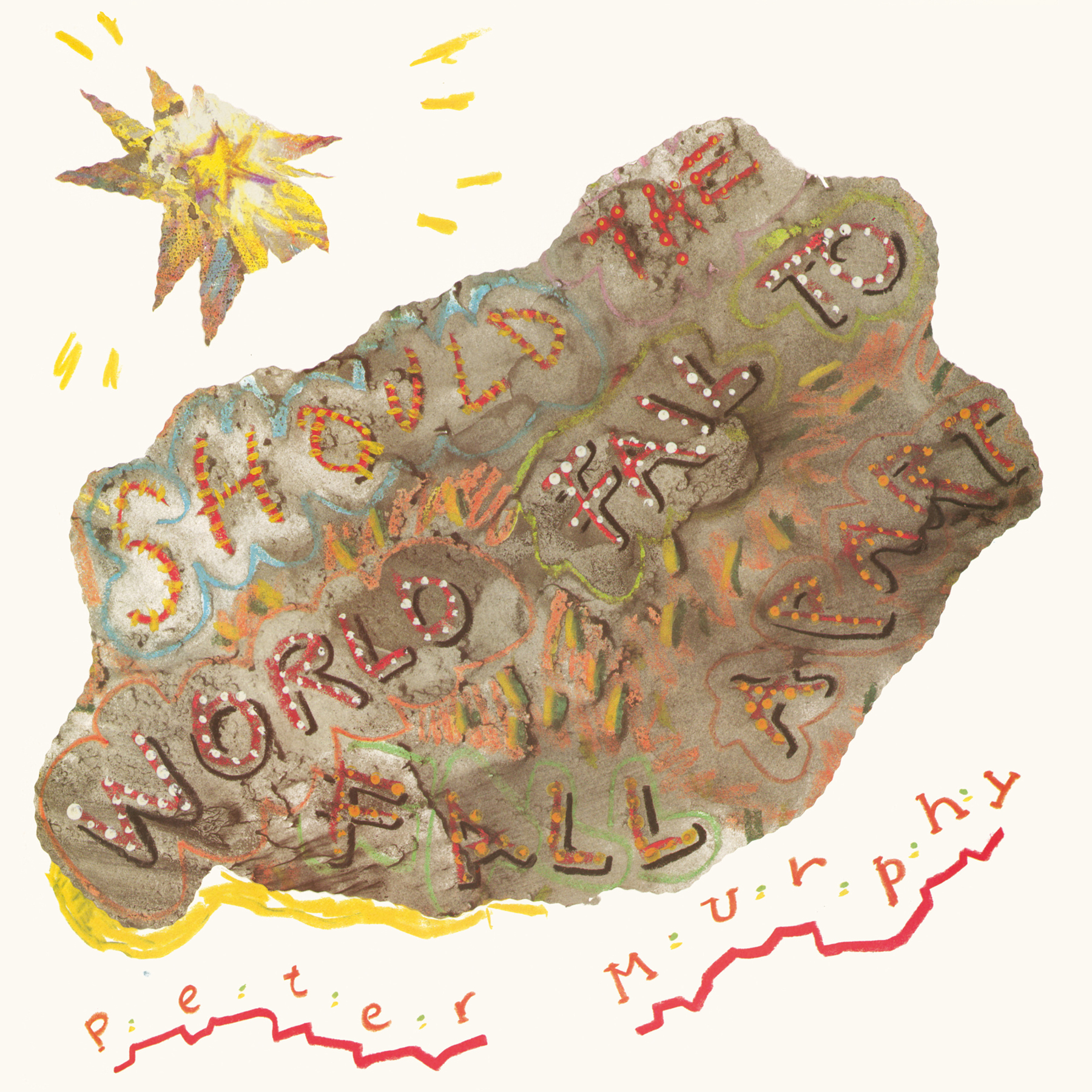 Should the World Fail to Fall Apart finds Murphy not entirely moving away from the entanglements of his former group, elaborating on the musical styles explored in Dalis Car. The musical stylings of his debut were problematic for me on its original release, enamored as I was of Bauhaus. Still, over the years, it has grown to become one of my personal favorites of his solo works despite it often being deemed one of his less worthy offerings. The album is reminiscent of a transition period, but the reissue is a reminder of his brilliance.
Should the World Fail to Fall Apart finds Murphy not entirely moving away from the entanglements of his former group, elaborating on the musical styles explored in Dalis Car. The musical stylings of his debut were problematic for me on its original release, enamored as I was of Bauhaus. Still, over the years, it has grown to become one of my personal favorites of his solo works despite it often being deemed one of his less worthy offerings. The album is reminiscent of a transition period, but the reissue is a reminder of his brilliance.
